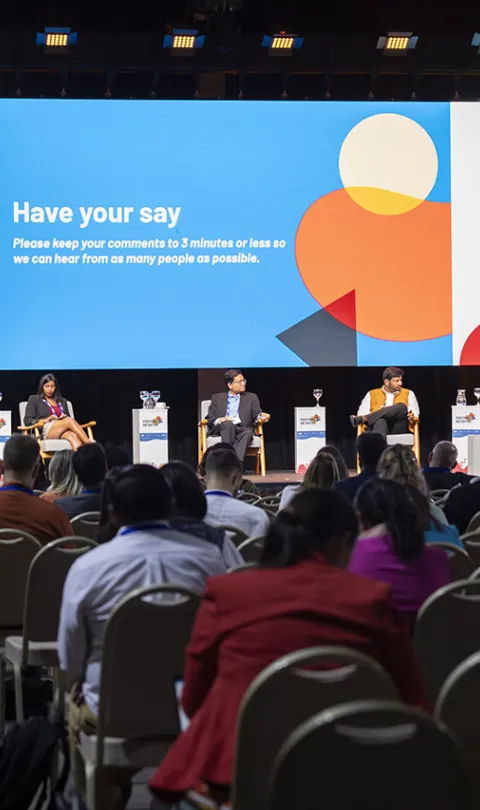Artificial Intelligence (AI) is everywhere. Not just in our phones, and in the websites we visit, and the products we buy, but also in the public conversation. At Festival de Datos this week, AI is the topic the network most want to address. Governments are wrestling with the question of how to regulate this thing which most of us don’t fully understand, while trying to spot the opportunities it presents.
Data is the raw material which powers AI, and AI has turbocharged the power of data. We used to say that data is the new oil – if that’s the case, then AI is the internal combustion engine.
Data for development, with values at the heart, is the core business of the Global Partnership network, so this is very much our territory. In September, we brought together a stellar group, to discuss with the Global Partnership Board what countries can do now to set the trajectories for future growth from AI that is more equal, and less harmful, than we have seen in past eras. This group included Sir Nigel Shadbolt, Professor of Computing Science at the University of Oxford; Ambassador Amandeep Gill, UN Technology envoy; James Hairston, Head of International Policy at Open AI; and researcher and advocate Nanjira Sambuil.
At its core, sustainable development is about values, and the belief that all people are entitled to the same rights and opportunities. This is the lens through which the data that powers AI must also be viewed. And, just to prove that very few problems are ever new, here’s four cliches that show how this can be done.
1. Garbage in, garbage out
If AI models are built with data that is biased, that’s poor quality, or that’s unrepresentative, the models that are trained on that data will have all kinds of negative consequences. All too often data fails to represent groups such as ethnic minorities, people with disabilities, or specific aspects of people’s lives such as incidence of domestic violence.
We’ve seen the consequences of this already, with well-documented cases of AI products which lead to harsher sentences for racial minorities, or women being excluded from jobs. Work on inclusive data is all the more important when the consequences of getting it wrong can be so far-reaching and so amplified by the effect of AI.
A focus on inequality and inclusion in data, through monitoring outcomes, checking datasets for biases, and linking outcomes back to datasets, should be hard wired into the different policy and institutional frameworks springing up globally to manage the production and impact of AI.
If AI models are to benefit people, people have to be fairly represented in the data that powers it.
2. First do no harm
The power differentials between the companies and organizations which collect the data, and which then develop and use AI from that data, and the marginalized communities who might be affected, are stark. LIke any powerful technology, AI can do great harm as well as great good, and data, if it’s misused to invade people’s privacy or to discriminate against certain groups, can be part of this harm. Managing and protecting the data that drives AI in order to protect the most vulnerable groups, is a critical part of ensuring that AI supports sustainable development.
Calls for change are coming from the industry itself, and many governments are developing policies and frameworks to govern both AI and the data that powers it. It’s vital that as agendas are set, whether at national, regional and global level, they are informed by the participation of those affected.
Data governance at every level should protect the rights of all people, including the most marginalized and those who have the least voice in the political process.
3. It’s the economy, stupid
AI is powering the profitability of established companies and creating whole new industries. The economic growth and change that comes from the use of data in AI applications offers an opportunity for a more equal pattern of growth. Unlike the natural resources which powered earlier eras of growth, data is produced everywhere, and can be put to work by anyone with the right access, skills and technology. What kind of growth comes from AI is a choice that is being made now, as new investments and new rules are being made.
Current debates over regulation at global, national and regional level offer a unique opportunity to think about creating a new framework for valuing, managing, sharing and distributing the raw material that is currently powering the most dynamic sectors of the economy. The challenge ahead of us is to do that in a way that drives the equitable and sustainable economic growth that all countries signed up to with the UN Sustainable Development Goals, but which has been so conspicuously lacking in the years since.
Global agreements on data and technology need to set parameters for more equitable global growth, in which all countries can benefit from the new opportunities of AI.
4. If you (can’t) build it, they (won’t) come
There’s equal parts worry and excitement about the AI that is being built. But an equal challenge is the AI that isn’t happening, in places where the skills and infrastructure are absent. Democratizing data skills is essential if the opportunities are to be widely shared. At present, research on AI is overwhelmingly concentrated in just a few countries: seventy percent of the most cited AI research papers in the last three years came from authors in US institutions. Infrastructure too is lacking – with one-third of the world’s population still offline.
This is primarily an investment agenda. If the world wants, as it says it does, an AI that solves the greatest challenges of the world, and that does good in the places where the need is greatest, then it has to come from those places. This needs money – investment in both the hardware and the human skills needed to successfully develop, manage and use the technologies of the future.
A fair AI future needs to offer opportunities for all - people should not be held back by lack of skills or lack of infrastructure simply because of where in the world they live.
AI is the future. To bend this future towards the outcomes we want, getting the data right is a critical part of policy agendas, for all our sakes.
Watch the replay of the insightful and hopeful town hall debate on AI, opportunities and threats at Festival de Datos:
Photo: The AI, opportunities and threats town hall at Festival de Datos. Credit: Nicolás Donatte


